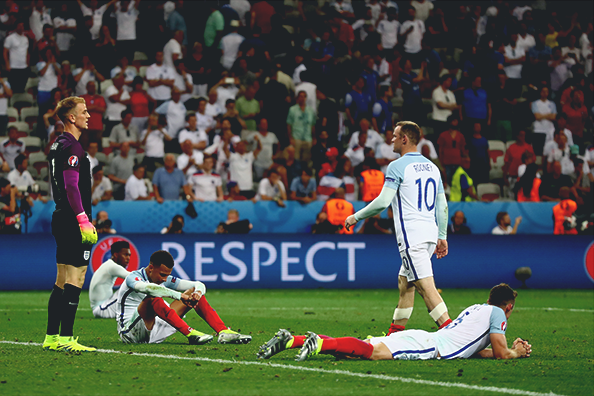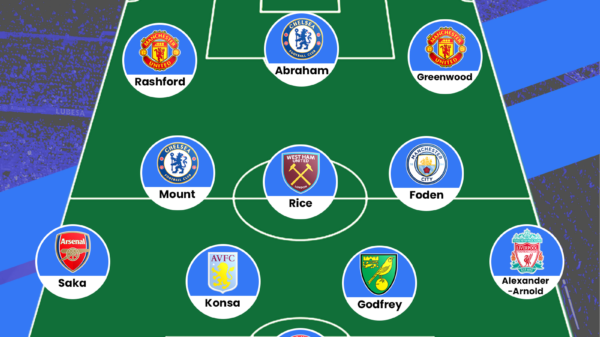Ham Mpanga has a look at why England have been struggling to produce world class talent in the recent past.
England have long considered themselves to be in the class of nations such as Germany, Spain, Netherlands plus to some extent Italy and France when it comes to producing world class talent and achieving national success. Although parts of this can be proven true, I will explain to you why this isn’t the case, and that England are in danger of falling behind unless serious changes are made.
Playing players in the right age groups
Most (if not all) Dutch clubs use an alphanumeric age bracketing system which allows all players of the same age to be given the same chance of development. This starts with F2 and F1 (8 and 9 years old) all the way through to A2 and A1 (18 and 19 year olds). This decreases the chances of youth teams being taken off their best players to play in higher age groups as every age bracket will have enough talent to contend with. Marcus Rashford, Dele Alli and Raheem Sterling have all played more games for England’s national team than the U-21 team. I’m not saying that the national team should only be for over-21s, but keeping them within their own age groups would encourage them to develop comfortably with players their own age rather than be criticised for not performing to the standards of more internationally accomplished players.
Examples of where this is being used successfully are in the Spanish national team. Everton’s Gerard Deulofeu (who is just a few months older than Sterling) is Spain U-21’s most capped player and top goal scorer. Saul Niguez is the 3rd most capped player for La Rojita while Hector Bellerin is more of a regular for the Under-21 team than the first team setup. Meanwhile Utrecht striker Sebastien Haller is the record scorer for the France U-21 team and he’s proving himself at club level, attracting suitors such as Everton, Tottenham Hotspur and CSKA Moscow on the way.
It can be argued that ‘if you’re good enough, you’re old enough’ and nations such as Spain, Germany and France are already packed with talent so it’s impossible to be selected but they’ve had to replace ‘the old guard’ so to speak with younger talent. These young players making the jump to the national team have come up together from the same international setup. This is evident in the German under-21 side (Joshua Kimmich, Max Meyer and Kevin Volland), the Spain under-21 side (David De Gea, Isco and Alvaro Morata) and the French under-21 side (Anthony Martial, Kingsley Coman and Aymeric Laporte).
If we go back to the 2013 European Championship in Israel, Jordan Henderson, Danny Rose, Nathaniel Clyne and Jack Butland are the only players from that England team that have been called for the first team in the last 12 months. Spain have more than double the amount of players called up in the last 12 months ( De Gea, Nacho, Bartra, Inigo Martinez, Carvajal, Koke, Thiago and Morata), so we can see that allowing players of a similar age group to develop together is a positive. For the 2017 under-21 European championships in Poland, England’s team could be built around the likes of Dele Alli, John Stones, Luke Shaw, Harry Kane, Raheem Sterling and Marcus Rashford. All would be eligible but all having played for the national team already would their personal and the media’s egos allow this to happen? This would surely be seen as a ‘demotion’ by the Premier League first-teamers listed but the cycle has to be broken somewhere.
The price and Quality of the FA’s Coaching badges Compared to Other Nations
Currently, the FA UEFA B coaching badge course will cost you £720 while the UEFA A course will set you back by £4885. As an aspiring coach intending to do my level 1 coaching badge at 16 next year, it is quite remarkable to see a price hike of £4165 should I choose to do my UEFA B & A licenses but why it this the case? What makes the FA’s UEFA A coaching badge so good that it has to cost £4885? Are you taught about a proud footballing philosophy to educate the next generation with? Do you learn an internationally respected formula for success? Or even a way of playing football that can be identified as ‘English’? I can firmly answer these questions with a no.
As per a UEFA Coaching Convention report published on October 1st 2013, England only had 205 qualified UEFA pro license coaches and that figure is unlikely to have improved by another 100 people by the end of 2016. By stark contrast, Italy had 725 qualified pro coaches, Germany had 1304 and Spain had 2353. At the time of the report’s release, Spain had 10 times more qualified pro coaches than England; even Turkey had more qualified pro coaches (378) than England. This could be because of the quality of the coaching coaches, being modified time and time again (even as the level 1 and 2 coaching badge courses being overhauled completely as recently as the 27th April 2016). Or it could be due to coaches knowing their chances at the top would be limited with foreign managers and ex-players getting jobs in the professional game.
Antonio Conte, Pep Guardiola and Jose Mourinho landing the biggest British jobs this summer and Giggs being linked with the Swansea City job earlier in the season plus Frank Lampard being linked with (and Steven Gerrard turning down) the job at MK Dons shows why it’s understandable to see why paying for expensive coaching courses when you’re inevitably at the back of the queue doesn’t look attractive for prospective managers. Conte, Guardiola and Mourinho will always make for an exciting season of football and Giggs, Lampard and Gerrard could all make successful managers in their own right if given the chance but at the end of the day, would you want to pay up to £14,000 on all 5 coaching badges and spend almost 5 years of your life working for a chance you’d never get?
Management Stability at National and Club Level
Since 2006, England have had 6 different managers (with 2 of these permanent) while Germany have had one (Joachim Low) and Spain have 3 (Luis Aragones, Vincente Del Bosque, Julen Lopetegui). We can already see the problem. Poor coaching courses leads to a lack of top coaches being produced leaving the English clubs and the national team without capable home-grown managers. Consider this; If Germany, Spain and England had to hire a coach born in their own nation to succeed the current coach who is left in the least favourable position? After Low, Germany has Jurgen Klopp, Thomas Tuchel, Roger Schmidt and Julian Nagelsmann. After Lopetegui, Spain has Unai Emery, Luis Enrique and perhaps the biggest of them all, Josep ‘Pep’ Guardiola, and England? After the permanent appointment of Gareth Southgate, England would have the promising but raw Eddie Howe, Sean Dyche and Alan Pardew. Not to say the English trio are bad managers but their CVs’ are vastly inferior to a majority of the managers listed before them. Lopetegui also managed the Spanish under-21 team in 2013 which I’ve been referring to throughout. Although Stuart Pearce and Gareth Southgate both got the job in a similar manner to Lopetegui, promoted from u-21 team, both Englishmen were seen has stop-gap appointments rather than long-term appointments.

David James and Stuart Pearce watch from the stands during the European Under 21 Qualifier match between England U21 and Kazakhstan U21 (Photo by Matthew Lewis/Getty Images)
And if we delve deeper into this, England’s under-21 team has had 4 managers in the last 10 years. This is because another negative cycle has formed. Players are uprooted from the U-21 team into the national team; this causes the U-21 team to change rapidly, causing players to develop at different rates thus ultimately causing the national team manager to be sacked due to the poor performance of a squad with different levels of development.
Once talked about players such as Steven Caulker and Saido Berahino are victims of being called up for friendlies for the national team, never to be called-up again and then to find their place in the U-21 team taken(although their problems at international level could be attributed to club problems). This could also suggest that managerial stability at club level could also be a problem.
Promising Chelsea central-midfielder Nathaniel Chalobah has 32 caps at U-21 level for England but has only made 4 Chelsea first-team appearances since 2010 at the time of writing. Chelsea have had 6 managers between 2010 and Conte so why is it that it’s taken an Italian who’s been at the club for 4 months to incorporate him as a squad player now? Many will say this is because of Roman Abramovich’s way of ruthlessly sacking managers that strips Chelsea’s coaching set up from having any stability but had any of them been English, surely Roman would’ve been pressured by the media and Chelsea fans to give an English Chelsea manager time? If better, home-grown managers were produced year on year by the FA maybe would see less sackings throughout the Premier League and Football League. Maybe too we would see less of the Chelsea or Watford merry-go-round sackings in search of ‘that manager’ who can bring success and see more Burnley or Southampton type of appointments that put long-term stability ahead of short-term goals such as avoiding relegation or achieving a European finish.
In conclusion, this isn’t an issue that can be solved overnight, it will need the FA and the English Media to reduce their expectations of the national team for a few years to allow the national team and youth teams below to play a way of football we can all be proud of otherwise, this issue will become damaged beyond repair.
- Tactical Analysis: France 3-2 England | 10 man France disorganize England - June 18, 2017
- Tactical Analysis: Lyon 3-1 Ajax | Ajax proceed to Stockholm - May 16, 2017
- Rivals: Real Madrid vs Barcelona | El Clasico - April 30, 2017





























































